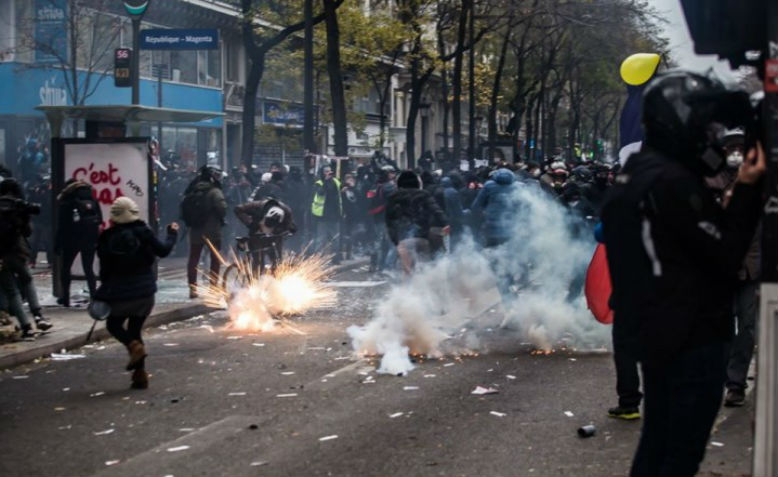 Teargas deployed against protesters in Paris. Photo: fair use
Teargas deployed against protesters in Paris. Photo: fair use
Across France, hundreds of thousands strike work and take to the streets to denounce neoliberal pension ‘reforms’, writes Susan Ram
On Thursday December 5, well over a million French workers, students and pensioners took to the streets in a roisterous, combative day of strike action and mobilisation against the Macron government. By every reckoning this has been the largest nationwide demonstration France has seen in recent years, with trade union organisers estimating the turnout at 1.5 million (against the official/police tally of 700,000).
In Paris, a quarter of a million people were on the streets. Close on the capital’s heels, Marseilles mustered 150,000 protestors while 100,000 took to the boulevards, bridges and medieval streets of Toulouse, transforming the ‘pink city’ into a tidal flow of banners and ‘gilets’ (vests), both red and yellow. The pattern was repeated across the country, not just in big cities such as Bordeaux, Grenoble, Nantes and Lyons but also in smaller urban centres: in Angers, 8,000 were on the streets, while in Châteauroux the turnout exceeded 6,000. In the small town of Guéret, located in the Creuse department south of Châteauroux, 2,000 people (out of a total population of 13,000) joined the protest: a jaw-dropping indicator of the level of anger bubbling away in communities across the land.
The street demonstrations were coordinated with nationwide industrial and public sector strikes called by France’s major trade union syndicates. These brought the national rail network to a standstill, seriously disrupted public transport in Paris and other centres, and wreaked havoc with airline schedules. Teachers were out in force: in Paris, those on strike were estimated at 78% of the total cohort, while nationwide more than 55% of teachers struck work for the day, joining forces with a huge student presence on the streets.
On the industrial front, workers in the energy and chemical sectors came out in force. An estimated 44% of EDF employees struck work, the percentage rising to 80% in some nuclear plants. Seven out of France’s eight oil refineries were confronted with blockades, along with a dozen or so fuel depôts.
Perhaps most significant of all, many strikers are continuing to withdraw their labour beyond December 5 — the day of action called by the CGT (Confédération Générale du Travail) back in September. At street and plant-level general assemblies across France on Thursday, protestors pledged to carry on into Friday and beyond. The morning of December 6 witnessed traffic chaos in Paris, with rail, bus and Metro closures contributing to an estimated 370 km of traffic jams in the Ile de France as early as 8 am. SNCF, the national rail operator, was forced to cancel 90% of high speed (TGV) services on Friday. And with two big Air Traffic Control unions calling for continued strike action on Friday, airline schedules, particularly those of Air France, remain shot to pieces.
Previous attempts at pension ‘reform’, notably the ill-fated efforts of President Jacques Chirac and Prime Minister Alain Juppe to ‘rationalize’ retirement payments back in 1995, have also sparked nationwide strikes and street protest. This time round, those taking to the streets appear equally numerous (union-sourced data for 1995 puts the number participating in the first day of that strike at just over a million), despite the battering trade unionism in France has suffered in recent years.
In addition, it’s apparent that the dogged, week-after-week resistance offered by Yellow Vests over the past 12 months is fortifying popular defiance. For many people at the sharp end of Macron’s grandiose Thatcherite project, there’s so much that is heroic and inspiring about this movement. The readiness of the Yellow Vests to place themselves on the line, facing down the tear gas, baton charges, assault weapon attacks and crippling injuries inflicted by the French State, appears to be stiffening resolve across the nation. According to the latest polls, close to 7 out of 10 people in France believe the current strike to be justified.
“It’s a bit like Christmas for us,” a striking teacher in Montreuil, near Paris, told reporters on December 5. “This mobilisation, it’s the gift we’ve been waiting for — for so long now! Today we’re on strike, tomorrow we’ll continue…”

